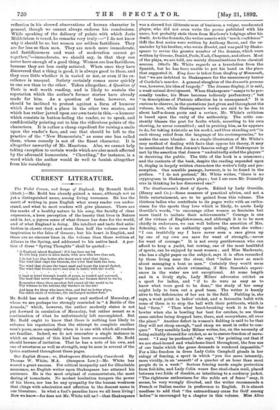Our English Homes ; or, Shakespeare Historically Considered. By Thomas
W. White, MA. (Sampson Low.)—Mr. White has scored a great success. For critical incapacity and for illimitable assurance, no English writer upon Shakespeare has attained his eminence. He is the most original of commentators, the most daring of iconoclasts. No modest hesitation tempers the power of his blows, nor has he any sympathy foe the human weakness that clings with admiration and affection to the cleared name in our literature. In what a fool's paradise have we all been living! Now we know—for does not Mr. White tell us ?—that Shakespeare
was a shrewd but illiterate man of business, a vulgar, uneducated player, who did not even write the poems published with his name, but probably stole them from Marlowe's lodgings after his death. As to the Sonnets, the writer asserts with "much confidence' that the first series were written by Anthony Bacon, and the re- mainder by his brother, who wrote Hamlet, and was paid by Shake- speare to revise the greater number of the dramas, which were- written by Greene, Daniel, Peele, Nash, Chapman, and others. Most of the plays, we are told, are merely dramatisations from classical sources. Othello Mr. White regards as a translation from the Spanish, but he has been unable to put his hand on the piece that suggested it. King Lear is taken from Geoffrey of Monmouth, but "we are indebted to Shakespeare for the unnecessary horror of Cordelia's murder. A general slaughter of the dramatis personx was, however, his idea of tragedy." The dramas display, it is said, a weak animal development. When Shakespeare "essays to be per- sonally tender, his Muse becomes tediously perfunctory;" but "in descriptions of Platonic affection he is unsurpassed." It is curious to observe, in the quotations just given and throughout the volume, how, while Shakespeare's works are said to be due to about half-a-dozen poets and a reviser, Mr. White's criticism is based upon the unity of the authorship. The critic con- stantly blames the poet for faults which, according to his own showing, he never committed ; and in praising him, as he appears to do, for taking Aristotle as his model, and thus standing out "in such strong relief from the language of his contemporaries," he makes the same blunder. As a single illustration of Mr. White's easy method of dealing with facts that oppose his theory, it may be mentioned that Ben Ton son's famous eulogy of Shakespeare is met by the assertion that Sonson "undoubtedly aided the players" in deceiving the public. The title of the book is a misnomer; and the contents of the book, despite the reading expended upon it, display in largely written characters the writer's folly and pre- sumption. One sensible passage, however, is to be found in the preface. "I do not pretend," Mr. White writes, "there is no cryptogram in Shakespeare's plays ; but I am sure Mr. Donnelly errs in thinking he has discovered one."


































 Previous page
Previous page